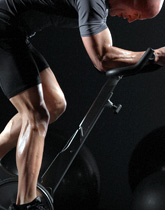
On the football field against Randolph-Macon College, Tartans offensive tackle Brian Freeman sweats through his shoulder pads in the sunny 95-degree heat as he takes his stance on the line. He yanks his shoulder pads into position while sweat drips from his facemask. He crouches low, right fist in the grass. The quarterback barks out, "Red! Set! Go!" Freeman bursts forward, driving the defensive lineman five yards backward in a dusty cloud.
After the whistle, Freeman struggles to catch his breath, his head pounding in his helmet. He also has a new perspective of a problem he has been grappling with in his Heat and Mass Transfer class. The third-year double major in chemical and biomedical engineering has just experienced how the still air on the field prevents players from cooling off properly. "Wow!" he thinks, "I need more convection right now."
After the game, he ignores his sore legs and bloodied arms as he heads to the library's third-floor carrels to finish his group project—determining why it's more difficult to ride an exercycle than to bike through city streets. He had figured out that the convection from moving air during a bike ride cools the body whereas the exercycle (like the hot football field) generates no wind to blow away the heat.
He calculates data well past 3 AM. The next morning he is early for his 9:30 AM class to present his results. He aces the project, which is why it should come as no surprise that for the second time, the College Sports Information Directors Association selected Freeman as an Academic All-American, honoring his classroom and athletic achievements.
—KATY RANK LEV



